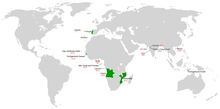Lusotropicalism

The term Lusotropicalism ( Portuguese lusotropicalismo ) is a combination of Lusitanien and trópico , the Portuguese name for tropical . This ideology propagated a historical and moral superiority of the Portuguese colonization compared to the other European colonial powers.
Although the history of the Portuguese colonies goes back to the 16th century, colonial institutions and a state education system were not established until the 1940s and 1950s under Salazar's dictatorship of the Estado Novo . Some areas were not classified as actual colonies. India was seen as a civilization in its own right that had dealt with European Christianity throughout history. Cape Verde , on the other hand, was seen as the result of a mixture of Portuguese colonial masters and African slaves who had been sent to a remote island group. Cape Verdean culture was not called colonial but regional, and the elite there enjoyed special rights, such as being sent to the African continent as colonial middlemen. Angola and Mozambique , in turn, were clearly African colonies and were given a special "constitution": In an economic system based on forced labor , the population was divided into three categories: Portuguese citizens, natives and "assimilated" . These were locals who had to go through probationary periods and pass exams to prove they were Christian, monogamous , did military service, and spoke Portuguese . The Assimilados never made up more than 1% of the colonial population.
The Brazilian sociologist Gilberto Freyre is considered an outstanding thinker of lusotropicalism . The core idea of lusotropicalism was a cross-continental, tolerant coexistence of races or the idea of racial mixing, for which Gilberto Freyre used the expression "racial democracy" ( Portuguese democracia racial ) in his later publications . However, Freyre originally only wanted to explain the origins of Brazilian society. The term does not appear in his main work “Manor House and Slave Hut ” ( Casa Grande e Senzala ), he coined it in the 1950s after an invitation to Portugal and its various overseas colonies. The term finally gained importance in the 1960s, especially during Salazar's dictatorship. Here it was used to legitimize the Portuguese claim to the African and Indian colonies, which without exception declared themselves independent of Portugal in the Portuguese Colonial War until 1973 .
After the collapse of Portuguese colonial rule, the post-colonial term Lusophonie was created to denote the Portuguese-speaking world.
Web links
- Miguel Vale de Almeida: Portugal's Colonial Complex: From Colonial Lusotropicalism to Postcolonial Lusophony ( Memento from July 23, 2011 in the Internet Archive ) (PDF; 85 kB)
- Lusotopia ( Memento from July 29, 2012 in the Internet Archive )
- Homepage of the Community of Portuguese Speaking Countries (CPLP) (port.)
supporting documents
- Helmut Brühl: When Portugal sings - Enigmatic People of Lusitania , pages 136–142 (O mundo português) and 142–144 (Marriage with the tropics). Dietrich Reimer Berlin 1957
- Gomes, Bea: O mundo que o português criou - On the invention of a lusophonic world. Viennese magazine for critical African studies 2/2001, vol. 1.
- Enders, Armelle: Le Lusotropicalisme, théorie d'exportation